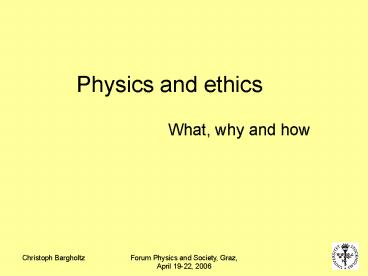Physics and ethics PowerPoint PPT Presentation
1 / 13
Title: Physics and ethics
1
Physics and ethics
- What, why and how
2
Is there a necessity for a special code of ethics
in physics?
Is there a need for physicists to adhere to a
code of professional etics?
How far goes the responsibility of physicists for
their work?
Should there be any ethical restrictions
concerning research topics?
Is the peer review system adequate to guarantee
best protection against scientific fraud?
Are there any ethical aspects in relation to
intellectual property?
3
Physics research, i.e. the pursue of scientific
knowledge, is a valuable and important human
endeavour
Scientific knowledge may be applied for good and
for bad
The application of scientific knowledge is
largely out of the hands of scientists
Physicists are not better people than others
4
Research ethicsinternal external
- Falsifying or withholding data
- Using anothers ideas without due credit
- Inappropriately assigning authorship credit
- Being too extrovert
- Breaking rules of collegiality
- Irresponsibility
- Irrelevancy
- (Immorality)
- A general distrust of elites with the exception
of sportsmen and (perhaps) medical doctors
Quality Efficiency
Trust Accountability
Dilemma Openness and good research practice
promotes our science but not necessarily the
individual. (compare sports)
5
CUDOS (Robert Merton, 1942)
Communal knowledge belongs equally to all
Universal disregard of nationality, sex,
ethnicity etc.
Disinterested independence and lack of
self-interest
Organized Scepticism accuracy in search of
sound evidence. Everything may and should
be open to critical question.
6
Influence of research environment and formal
(and informal) structures
Industrial research commercial interest
Academic research under contract conflict of
interests
7
Knowledge belongs equally to all
but
Research institutions increasingly
become commercial actors
Research workers have a duty to ensure
that intellectual property arising from their
work is properly safe garded.It is also vital
that they avoid public disclosure before patent
protection is achieved. (from ESF policy
briefing on Good scientific practice In research
and scholarship, December 2000)
8
CUDOS (Robert Merton, 1942)
Communal knowledge belongs equally to all
Universal disregard of nationality, sex,
ethnicity etc.
Disinterested independence and lack of
self-interest
Organized Scepticism accuracy in search of
sound evidence. Everything may and should
be open to critical question.
9
independence and lack of self-interest
but...
- Academic research is increasingly competitive and
- dependent on external funding
- Short time money for research
- Fixed time contract of employment
- Find external funding of your own salary
accuracy in search of sound evidence.
Everything may and should be open to question
10
The community of physicists should further
improve its self regulatory practices.
Physicists must accept personal responsibility to
uphold the integrity of their science and to
transmit its fundamental values to young
researchers.
To strengthen mutual trust physicists should
engage in dialogue with their fellow citizens in
order to share with them the excitement of
scientific discovery and obtain a better
understanding of currently felt needs and
anxieties.
11
In order to further the quality and efficiency of
physics research authorities should refrain from
any direct interference with its workings and
only regulate its practices to the extent deemed
absolutely necessary.
Forms of funding should be agreed upon that
minimise the risk of jeopardising the integrity
of physics research, professional standards,
openness and good practice.
12
(No Transcript)
13
(No Transcript)

